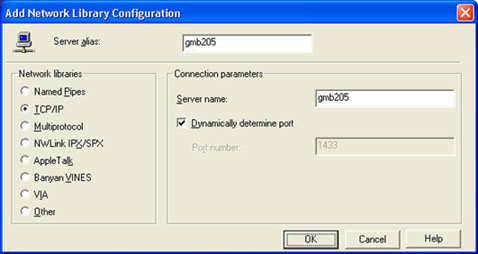How to improve the performance of RecFind
Overview
There are many factors that can affect the performance of the
RecFind application. For example:
- workstation configuration
- network bandwidth and utilization
- database server configuration
- RecFind application
This FAQ lists some of the common things that you can try to improve
performance.
Workstation Configuration
ODBC / Networking Configuration
Confirm that the ODBC driver is using TCP/IP as it's
connection protocol and review the workstation's Windows network configuration to ensure that
there are no unnecessary protocols defined.
To determine which network protocol ODBC is using:
- Select Data Sources from the Control Panel
- Select the RECFIND4 data source (may be on
the System DSN tab) and click 'Configure...'
- Click 'Next' to move to the second screen
- Click on 'Client Configuration...'
- Ensure that TCP/IP is the selected Network
Library (see below)

Antivirus Software
Anti-virus software can also cause the RecFind modules to be
slow to load. This is because every time an application is loaded it
undergoes a virus scan. Temporarily disabling the anti-virus client or
disabling the scanning on RecFind's application files will confirm if
this is the cause.
Note: Although we have had reports of this in the past, no
current anti-virus products are known to cause any performance
issues.
Network Bandwidth & Utilization
Implement the AIM Utility
To reduce network usage, implement the RecFind AIM utility (a
standard inclusion with RecFind). By using the AIM,
online indexing can be disabled which reduces the amount of
processing required when adding or modifying a record, therefore
significantly improving performance.
For more information on the AIM please refer
to the installation manual and our FAQ (click here).
Install RecFind Locally
You can also reduce network traffic by installing the RecFind
application locally -
in a WAN environment this could be on a local file server, however it
could also be on individual workstations. Knowledgeone Corporation doesn't recommend installing
RecFind locally due to the maintenance that is required, however on busy
networks you may
find this necessary.
Please note when installing RecFind locally you must run the setup
application from the RecFind CD-ROM with a "L" command line
(i.e. run "D:\SETUP.EXE L"), failing to do so will cause
certain RecFind functions to fail and is also a breach of licensing.
With the "L" option specified, the setup program will ask for an installation
directory as well as the location of your main RecFind installation. You
must have a drive letter mapped to the main RecFind installation prior
to installing.
Database Server Configuration
Microsoft SQL Server and Oracle may need to be optimized to provide
ideal performance. These products are complex and detailed information
on optimizing these products is outside the scope of this FAQ.
Some factors include:
- Memory (RAM) - Memory is very important to
database products and increasing it will definitely improve their performance.
Many people suggest that you should try to have enough RAM to store the entire database
in memory.
- Hard drives - You can achieve faster
performance by splitting the database over different physical hard
drives (e.g. the transaction log file on one disk and the data file on
a different physical disk). RAID is another method of splitting the data
across multiple disks.
- Other applications - If you are
experiencing performance issues, restricting other applications running
on the database server will reduce processing workload, disk access
load and
memory usage. For example, we generally wouldn't recommend running
Microsoft SQL Server on a server that is also
running Microsoft Exchange.
Suggested reading:
- The Definitive Guide to SQL Server
Performance Optimization
(Available as a free e-book from Real Time
Publishers -
click here)
RecFind application
Load all updates
Knowledgeone Corporation often review and improve the performance of the application.
Please ensure that you are running the latest version of RecFind with
any service packs applied. For the latest service packs, please refer to
our service pack pages (click
here).
Contact Knowledgeone Corporation Support
If you find a particular function slow, supplying a trace log to Knowledgeone Corporation
support will allow us to determine whether the code needs optimizing.
For instructions on running a trace, please refer to our FAQ (click
here).
Use record criteria
Although uncommon, in some cases RecFind will need to perform
significant processing to provide a result. If you can, restrict the amount of data
that RecFind needs to process by supplying a
record number range rather than using "*all" or supply date
ranges when appropriate.
Purge Data
Purging old information can also reduce the amount of data in
your database and therefore improve performance. RecFind includes a
purge module that allows a variety of criteria to be specified to select
what can be deleted permanently from the database. For example, you can purge file movement
history and remove all movements except for the recent 9 movements.
For most organizations this is more than enough movement history.
For obvious reasons, please take care when purging. To avoid any
unexpected data loss, it is
recommend that you take a database backup when first using these
functions.
Other options
RecQueryTC
RecQueryTC is a web browser based client that is available. Functionality is
limited to searching functions however it may provide enough
functionality for the majority of users. As a web browser based
client, only minimal amounts of information will be transmitted
between the web server and workstation.
Citrix/Windows Terminal Services
Citrix/Windows Terminal Services is commonly used to provide
high-performance over a WAN link. It works by having users
connecting to a server and running the application from that server,
only providing screen changes and key presses over the WAN link.
RecFind can function in this environment with a minor configuration
change. For more information click here.
» Back to FAQ index
|

